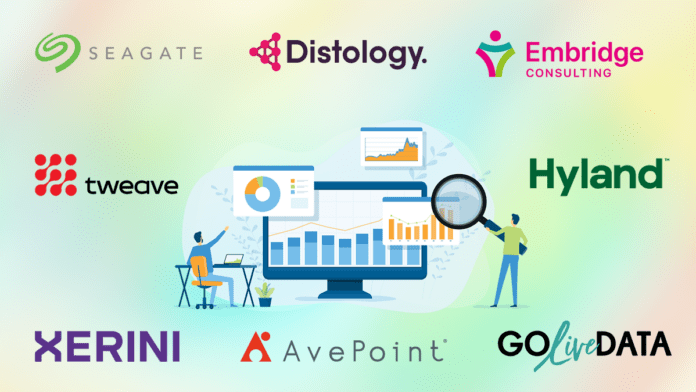With businesses producing more data than ever before, the need to manage it effectively to ensure it can be harnessed and deliver value is imperative and resellers have an important role to play in this.
As more business is undertaken online, so more data is produced by organisations of all sizes. Indeed, the global population generates 30 zettabytes of data each year, notes Andrew Palmer Seagate’s UK channel lead for Enterprise Data & Cloud Solutions Group.
But with such incredible amounts of data being produced, it needs to be effectively managed if it is to deliver value.
“Data is an invaluable asset for businesses as it drives growth, fuels innovation, and improves the customer experience,” says Andrew. “But it is growing faster than the world’s ability to store it: only two zettabytes of storage capacity are manufactured each year.
“As the volume and velocity of data increase, many businesses across a multitude of sectors are unable to tap into the full potential of today’s data-driven world. Not only do they capture and use just a fraction of the data they generate, but they also struggle with data management strategies.
“One of the key management challenges stems from the complexities of storing and managing scattered data. Residing in multiple locations, data often sprawl – spreading through endpoints, the edge and multiple clouds. This means businesses are missing out on new opportunities and potential revenue.
“Data is no longer created solely within a data centre. The amount of data generated in the cloud, as well as by emerging technologies – such as IoT and edge computing – continues to grow. How and where data is stored can greatly affect the value that organisations can derive from it. Yet, organisations are only collecting 56% of the data potentially available through operations.
“Attempting to capture all available data, however, would strain the existing IT infrastructure and increase costs. That’s one of the many reasons why businesses of all sizes must rethink data management. For example, identifying and classifying data at the start of its lifecycle enables faster data pruning, and that translates to lower costs.”
Sascha Dobbelaere from Tweave agrees that data management is the core of any business. “It’s the basis of all success if managed well, and the root of all evil if managed poorly,” he says. “The right foundation with core business data can propel a business forward.
“Whether we’re talking about products, customers, services or suppliers, treating your data correctly and updating it meticulously are really core values that a business should maintain. The data is here to be leveraged, used and expanded so that businesses can serve customers better, offer better suited products, improve supplier relations, use new marketing techniques, or expand into new territory. With the right data in place, it’s a child’s play. Without, an uphill battle.”
Steve Haines, chief commercial officer of Embridge Consulting, adds that businesses must be able to manage data effectively and efficiently. “Bringing it together to provide intelligence that supports operational efficiency and informed decision making,” he says.
“The growing importance of data management can be seen in the recent paradigm shift. Before, companies were focused on people and processes. Now, it’s data, people and processes, as without data, informed decisions that have serious business impacts, simply cannot be made.
“To ensure employees have the right data for decision-making, companies in all sectors must invest in data management practices and solutions that improve visibility, reliability, security and stability.
“As the scope and scale of data generated by organisations grows, data management practices and solutions become essential, making essential business functions easier and less time consuming. Good data management practices are important for businesses of all sizes, as those without significant in-house data capabilities have the option of using integration as a service solution to level the playing field and compete with larger organisations in terms of integration, management and analysis of data.
“Data is essentially the new oil – it is the most valuable asset companies have. It’s important that businesses of all sizes have robust management in place because it is the driving force behind decisions and actions, and it is vulnerable to being stolen, which can have far-reaching impacts for businesses and their employees if that data contains personal identifiable information.”
Customer trends
With businesses across the spectrum now looking to harness their data, it is changing their demands. “Traditionally, businesses built data warehouses to consolidate data storage, but this can be a challenge, particularly for smaller businesses with limited resources,” says Jonathan Williams, partner at Xerini.
“A data warehouse is a structured, centralised system that makes reporting and managing data easier, but the time-consuming set up can delay gaining visibility over data. If any business goals change during the build, the warehouse may no longer meet the needs of the team and the data might not be up to date.
“Now, businesses are seeking alternatives that offer real-time access to data, actionable insights and cost-effectiveness. Cloud-based platforms, for example, offer real-time access to data for analysis that facilitates data-driven decision-making, saving time and resources for businesses.
“Businesses also want something scalable. Data mismanagement often happens accidentally because of organic business growth – businesses will invest in a new software or workflow management system to meet an immediate need, but it might not connect to existing infrastructure. Instead, businesses want scalable management solutions to ensure that, as the business grows in size and complexity, the data infrastructure can accommodate increased volumes of data and users without disruption or overhaul.”
Sascha adds that data management solutions for SMBs go hand in hand with their business software, with several crucial considerations:
• Simplicity and ease of use: solutions that are straightforward to set up and manage, without needing specialised IT skills
• Affordability: cost-effective options with clear pricing, avoiding large upfront investments
• Scalability: ability to grow with your business without needing a complete overhaul
• Security: Strong basic security features to protect your data from common threats
• Integration: Easily works with the tools you already use, like accounting software or customer databases
• Support: Accessible customer support to help when issues arise.
“In recent years, small businesses have shifted towards cloud-based solutions for their flexibility and minimal maintenance, emphasising more on real-time data access for quicker decision-making, and focusing on user-friendly platforms that don’t require deep technical expertise,” he says.
Reseller conversations
With customer needs developing, resellers have an important role to play in ensuring they get the right solutions for their needs.
Jonathan advocates that to determine the best way to optimise data management, businesses should conduct a thorough needs assessment. “Considering factors such as data volume, variety, real-time needs and available resources,” he says. “Then, businesses show review current operations, identifying any bottlenecks and pain points that limit productivity and understand the capabilities of existing systems to handle these issues.
“Once pain points are identified, businesses can work with resellers to tailor their data management, creating a strategy that is scalable, cost-effective and meets the needs of the team. By developing an incremental optimisation strategy, businesses can ensure they address the most challenging pain points first, demonstrating its value and improving productivity from the outset.”
Chris Shaw, UK&SA senior distribution manager at AvePoint, adds: “Even if you’re not in a data orientated business, the need to make sure data is secure, governable, and justifiable is so important. If you are in a data-based business it’s critical to ensure you can generate revenue off the back of it! You need to invest in the correct tooling for the qualified job at hand.
“We need to be helping MSPs build out scalable services around data assessments, readiness plans and analytics. Not all data is good data and that can lead to multiple projects and opportunities. They need to be crystal clear on the outcomes and benefits and how AI can be leveraged to help the customers’ specific use cases and challenges. SMBs particularly can get really close to customers and add significant value to help them navigate this shift in the market.”
Lance Williams, CTO at Distology, adds that businesses should consider a hiring virtual data protection officer (vDPO) if they don’t have one internally. “Most organisations won’t openly admit that their data management is less than optimal, but it probably is,” he says. “If resellers have access to a vDPO services and can perform a data protection compliance baseline GAP analysis for a customer and help them with a get-well plan, then the potential right technology tools, processes and policies can follow.”
Sascha adds that when choosing a new solution for SMBs resellers should pay special attention to several factors. “For instance, can I export that data in the future, in a format that that other software tools can import such as JSON, XML? Does the software allow me to leverage the data with various api-integrations that come out of the box? What other software tools can be integrated with core business software that will help drive revenue, customer loyalty or reduce costs?” he says.
“In addition, does the company have plans to integrate with popular AI tools like ChatGPT to access information in new formats? Is the solution future proof? Does the solution help in a holistic way? It’s very easy to purchase many small tools but these probably play poorly together and, in the end, run a large bill. Consider if a more expensive, all-encompassing solution will work out more cost effective without trading off in ability.”
Andrew says that when plotting a data management strategy, the channel can support SMBs by helping them to prioritise data readiness by identifying relevant data sources and aggregating them in a way that will help drive stakeholder trust, as well as business productivity, sustainability and resilience. “By prioritising valuable datasets and investing in robust IT infrastructure, SMBs can unlock the potential of their data and enhance their competitiveness,” he says.
Tim Hood, VP EMEA & APAC at Hyland, says that resellers should identify the customer’s current data challenges as the starting point for conversations.
“A key consideration is speaking the customer’s language – don’t overuse technical jargon,” he says. “Focus on how data management can improve specific business goals, and highlight tangible benefits such as increased sales, operational efficiency, cost savings, improved customer experience, and data-driven decision-making.
“Offering tailored solutions is going to give you a competitive edge. Understand the customer’s industry and size. SMBs must differ from large enterprises, so recommend solutions designed for their scale and budget. To deliver those needs, focus on user-friendly, cloud-based solutions that offer quick implementation and easy maintenance.
“By focusing on the SMB customer’s needs, challenges and potential benefits, resellers can have productive conversations that lead to successful data management implementations. It’s not just about selling technology, but about helping them leverage data to achieve their business objectives.”
AI impact
Tim adds that AI and automation are revolutionising data management by automating tasks, improving data quality and driving insightful analysis. “While ethical considerations and responsible implementation are essential, the benefits of AI for channel customers and data management solutions are undeniable,” he says. “By embracing these advancements, businesses can unlock the full potential of their data and gain a competitive edge in the data-driven era.
“AI-powered tools can automatically retrieve data from diverse sources, like APIs, databases and sensors, reducing manual tasks and ensuring data accuracy. It also helps to identify and reconcile data inconsistencies across different sources, enabling seamless integration and eliminating data silos.
“Security is another area where AI shines. AI models can identify unusual patterns and suspicious activities in real-time, enhancing data security and protecting against threats. They can also implement and enforce dynamic access control policies based on user roles and permissions, ensuring data security and compliance.”
Jonathan agrees that AI can help solve problems cost-effectively, speeding up administrative tasks and freeing up the workforce for value-driving activities.
“Some of the most impactful areas to use AI in business are in data management and analysis,” he says. “Structured and unstructured data can be tagged and classified, so that information is more accessible with a centralised cloud-based data management system and easier to find using natural language search.
“There are numerous artificial intelligence tools and models available, with varying use cases. Businesses can use AI for anything from connecting large amounts of data to Open AI to improve internal search functions, all the way through to a bespoke private model pretrained for specific tasks.”
Steve adds that generative AI is changing the world. “Every aspect of working with data needs to be viewed in the light of if and how generative AI can help.
“Automation is bringing more data together, much faster. Systems can now almost be updated in real-time.
“The huge amount of data generated – either by systems or by integrations and automation of several systems – would be much harder to interpret and bring together without AI. AI can summarise huge amounts of data and put it in useful context.
Co-founder and CEO of Go Live Data, Adam Herbert, adds that customers are also looking towards AI to uncover insights and opportunities. “Welcome to the era of AI and automation – a revolution that’s reshaping the very fabric of data management,” he says.
Adam adds that customers want explainable AI that “peels back the curtain on the wizardry of algorithms, building trust through transparency and provides personalising insights for every audience, from the boardroom to the shop floor.”
He adds that it can also boost efficiency: “Liberating human minds from mundane tasks, allowing them to focus on strategic endeavours,” says.
“Data management isn’t merely a tool in the arsenal of success; it’s the cornerstone upon which empires are built and legacies are forged. By embracing it, we pave the way for a future where dreams know no bounds, and success is limited only by the scope of our imagination.”














